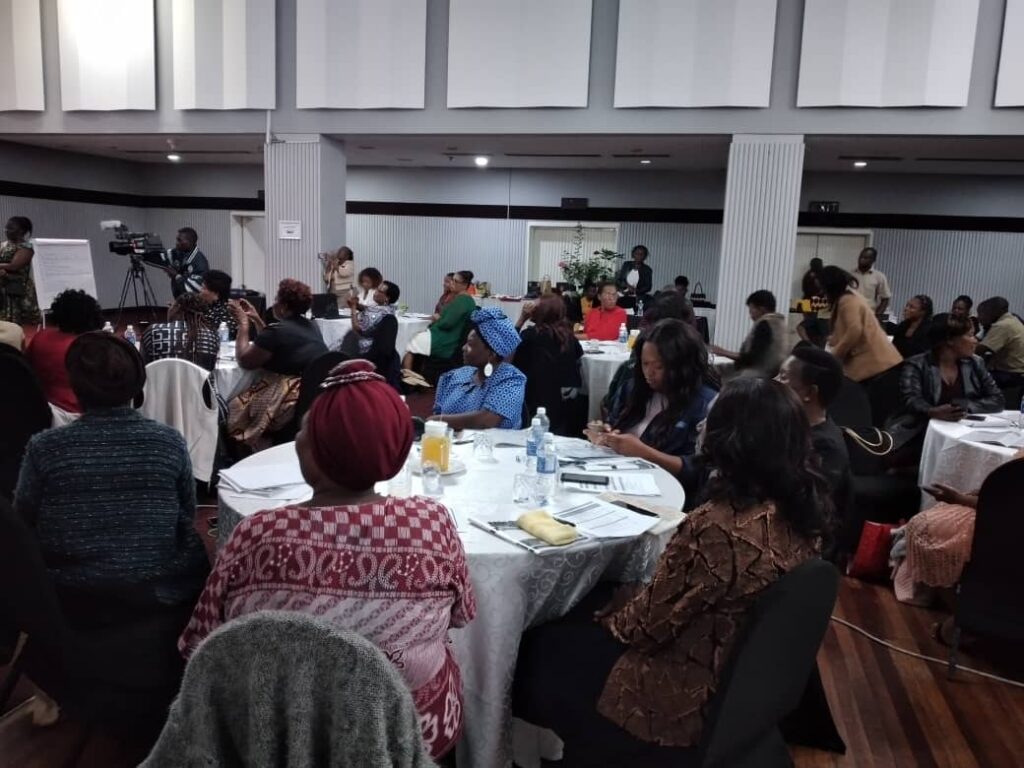MSMEs and economical growth
Micro, Small and Medium-sized Enterprises (MSMEs) are significantly promoting inclusive and sustainable economic growth in Zimbabwe following its USD8.6 billion to GDP contribution.
This was revealed at the workshop by Permanent Secretary for Women Affairs, Community, Small and Medium Enterprises Development, Moses Mhike.
The main objective of the workshop was to train MSMEs with a focus on women and youth including people with disability to manage their business efficiently and become resilient in times of shocks is therefore critical. It was a crucial training as it sought to transform MSMEs business operations. The workshop was under the Strengthening Resilience of MSMEs in Africa and Asia Project supported through the Division for Sustainable Development Goals, United Nations Department of Economic and Social Affairs.

Workshop Presentation
In addition, there are 3.4 million MSMEs working in Zimbabwe, employing 4.8 million people full time, according to the 2021 MSME Survey. The expansion of employment possibilities and decent employment, particularly for women and young people, are other goals of MSMEs. They also help economies shift from being driven by basic commodities to ones that are driven by sustainable invention and industrialization.
Role in Zimbabwe
The industry also plays a significant role in Zimbabwe, where there is a strong drive for decentralization and devolution, as it helps to promote balanced development, which enables MSMEs to thrive in both urban and rural areas across the entire country.
Moreover, MSMEs contribute significantly to global economic progress and sustainable development. Around 90% of businesses and more than 50% of jobs globally are held by SMEs, which can account for up to 40% of GDP in emerging economies. (World Bank).
“Recognizing the potential contribution of the MSME sector to the attainment of Vision 2030 of an upper middle-income economy status as underscored by the National Development Strategy (NDS1), in 2022 Government with support from UNDESA prioritized the development of a results-oriented Monitoring Framework for timely tracking of MSMEs contribution to the economy under the Revised National MSME Policy (2020-2024),” stated Mhike during the workshop presentation.
The government’s efforts to address the challenges facing the sector, such as low productivity and competitiveness due to use of outdated technologies and aging equipment, high utility costs, unfavourable regulatory requirements, limited access and high cost of finance, weak managerial, technical and entrepreneurial capacity, have been complemented by this additional support for the sector under the UNDESA project that we are witnessing today.
COVID Aftermath
Global shocks like the COVID 19 pandemic, geopolitical unrest, and climate change, which have a negative impact on MSMEs companies, have added to these difficulties. The COVID pandemic, which devastated the world and resulted in travel limitations, made it clear that remote work was necessary and increased the urgency of equipping MSMEs to use digital platforms for business. MSMEs now require a foundational understanding of digital marketing in order to stay competitive, durable, and to conduct business both domestically and abroad.

Besides training, the Ministry is implementing a number of programmes to improve access to markets, financing and workspaces to SMEs among other interventions.
To improve market access, MSMEs are being supported through raising awareness of available local, regional and international market opportunities including using digital platforms such as the 50 Million Women Speak. MSMEs are being supported to participate at ZITF, Zimbabwe Agricultural Show, provincial and district fairs.
Promoting Export
Regionally and internationally, the Ministry in collaboration with ZIMTRADE is on a drive to promote exports through participation of MSMEs at expos and exhibitions such as Zambia International Trade Fair, Malawi International Trade Fair, Botswana Global Expo, Maputo International Trade Fair, Dubai World Expo among others.
In 2022, Zimbabwean SMEs scooped prizes for being the best and second-best SME exhibitors at the Mozambique and Botswana Expos respectively.

Additionally, Mhike added that , “In line with the Second Republic’s thrust to develop backbone infrastructure through promoting partnerships, the Ministry is collaborating with local authorities, development partners and the private sector in development and provision of workspaces for MSMEs under various models.”
Under the National Financial Inclusion Strategy, the Ministry in collaboration with RBZ has implemented a number of initiatives aimed at improving MSMEs financial inclusion. This has seen a huge decrease of the financially excluded MSMEs from 43% in 2012 to 3 % in 2022. The recently launched Collateral Registry System is expected to facilitate further easy access to credit and encourage economic activity and stimulate growth in the sector.
Where to Now?
The Ministry through empowerment funding facilities which include SMEDCO, Zimbabwe Women Micro Finance Bank, Women Development Fund and Community Development Fund is also providing funding to MSMEs.
The training was delivered by two consultancies namely EMPRETEC and Back to Basics. The workshop was attended by a number of local officials, Members of the Media and MSMEs. Participants were handed certificates at the end of the workshop.
#News in Bulawayo #News in Zimbabwe Artist Arts BCC Bulawayo Bulawayo City Council Bulawayo economy Bulawayo industry Bulawayo news Bulawayo Police Bulawayo Water Bulawayo Water Crisis Bulawayo Women entrepreneurship Business Women Cholera Community Culture Currency Drug Abuse Drugs Economy Farmer Farmers Farming Informal Sector Informal Traders Mining MSMEs Music News in Bulawayo News in Zimbabwe Police Police in Bulawayo Vendor Vendors water Water Crisis Water Shortage water supply issue Women entrepreneurship ZESA Zimbabwean economy Zimbabwe news Zimbabwe water crisis ZRP
Our stories told by us!
Join us in all News in Bulawayo.













Comments 8